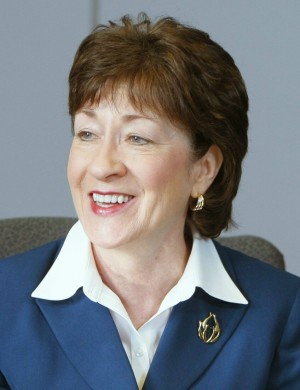WASHINGTON — U.S. Sen. Susan Collins of Maine started 2013 with more than $900,000 in her campaign war chest and approval ratings that, according to one recent poll, put her among the five most popular senators.
The question is: Will anyone step up to challenge her in 2014?
Documents filed this week with the Federal Election Commission show that Collins is amassing campaign funds, just in case.
The senator has raised more than $1.1 million in the current election cycle, including $113,167 in donations from Oct. 1 to the end of December. She ended the period with $921,220 in cash on hand.
The $1.1 million is more than twice Collins’ total at this point in her 2008 campaign, when she defeated then-U.S. Rep. Tom Allen, a Democrat, in a race that set a Maine record for total spending, at $14 million.
Democrats and Republicans in Maine are now gearing up for what is expected to be another bruising race for governor in 2014.
By contrast, no one has announced intentions to run against Collins for her Senate seat next year, despite conservatives’ rumblings about a potential challenger to the moderate Republican. Even if a conservative challenger emerged, he or she might struggle to find support in the party.
“The House Republican leadership fully supports Sen. Collins in her next run against any primary challenger,” said David Sorensen, spokesman for Republicans in the state House of Representatives, on Friday.
Maine Democrats say they expect to field a candidate, but no high-profile names have emerged. All attention appears focused on who will run against Republican Gov. Paul LePage and independent Eliot Cutler, who finished a close second in the 2010 race.
“We’re always excited about the opportunity to strengthen Democratic control of the U.S. Senate,” said Maine Democratic Party Chairman Ben Grant in a statement to the Portland Press Herald. “It’s still early in the election cycle, and in the coming months we’re eager to see Democratic candidates emerge to challenge Susan Collins in 2014.”
A recent survey by Public Policy Polling suggested that even two of Maine’s more popular Democrats — U.S. Reps. Mike Michaud and Chellie Pingree — would fall to Collins by 20 percentage points or more.
Among Republicans, one name mentioned repeatedly as a potential conservative challenger to Collins is Bruce Poliquin, the former state treasurer who ran for governor in 2010 and U.S. Senate in 2012.
Poliquin could not be reached for comment on Friday, but some Republicans have reportedly been urging him not to run.
Collins has yet to formally announce her candidacy, but her spokesman, Kevin Kelley, said Friday that she “has indicated that she plans to run for re-election.”
Sen. Olympia Snowe dropped her re-election bid about eight months before last year’s election, opening the door for independent Angus King’s victory.
Collins has yet to begin full fundraising, despite the cash flowing into her campaign account. About $47,000 of the $113,000 she raised in the final three months of 2012 came from individuals.
The remaining $66,500 came from political action committees, with most of it tied to a $1,000-per-PAC birthday party and fundraiser for Collins on Capitol Hill in December and a fundraiser sponsored by a home health care group in Florida in November.
Her ability to raise large sums of cash even when she’s not campaigning is one of two major advantages that most congressional incumbents have. The other is name recognition.
The poll of more than 1,200 Maine voters released last week by Public Policy Polling showed that Collins had a 60 percent approval rating even among Democrats. Roughly 65 percent of Republicans in the poll approved of her job performance, as did 62 percent of independents.
Those figures put her in the very top tier in the Senate.
“We’ve polled about 90 sitting senators and, out of those, she is tied for fourth place,” said Tom Jensen with North Carolina-based Public Policy Polling.
Jensen noted that Snowe consistently ranked in the top 10, making Maine and Wyoming the two states that are happiest with their senators.
The poll also suggested that Collins could be vulnerable to a conservative primary challenger. She led only 49 percent to 46 percent when gauged against a hypothetical, unnamed “more conservative” primary opponent.
Jensen said Republican incumbents with higher approval ratings than Collins have lost in primaries.
“Unless you have over an 80 percent approval rating within your own party, you are vulnerable” to a conservative challenge, Jensen said.
Kevin Miller can be contacted at 317-6256 or at:
kmiller@mainetoday.com
On Twitter: @KevinMillerDC
Send questions/comments to the editors.




Comments are no longer available on this story